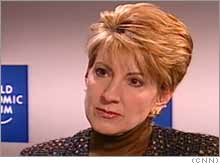Fiorina opens fire In an interview with Fortune's David Kirkpatrick, former HP CEO Carly Fiorina gives a blunt appraisal of her critics, and the recent scandal.
NEW YORK (Fortune) -- Carly Fiorina has been mostly quiet since her tumultuous firing as CEO from Hewlett-Packard 20 months ago. No more. With her new book, "Tough Choices," hitting the bookstores Tuesday, excerpts in this week's Newsweek, and a segment on last Sunday's 60 Minutes, Fiorina's fire and eloquence is again much in evidence. But if you want her full account about what happened to her and what she thinks of the recent ethical debacle at HP, read the transcript of a lengthy interview I conducted with her last week, available exclusively at Fortune.com.
In the interview, she asserts that while HP (Charts) conducted investigations of internal malfeasance under her leadership, she never knew of anything like pretexting, or the improper impersonation of people to dupe phone companies into releasing calling records. That's what HP has admitted detective firms did while working for the company after her departure. Here's an excerpt from Fiorina's remarks on the recent scandal: "Forget the legality. Let's go back to character, judgment, ethics, perspective. I think there is an impact on the Hewlett-Packard reputation, and I think it's very sad." She explains that ethics were the province of a senior vice president of corporate affairs and global citizenship when she was CEO, and only moved into the legal department under the leadership of current CEO Mark Hurd. (HP's former chief ethics officer, lawyer Kevin Hunsaker, has been indicted by the California state attorney general for his actions in the controversial investigation of boardroom leaks to the press.) Fiorina also gives her blunt appraisal of why she thinks HP's board summarily fired her in February 2005: "You had a dysfunctional board with a couple members who were offended that I would not acquiesce to a set of ideas or pet projects that I didn't think served the interests of the business. They were offended when I refused to cut corners on rules of good governance, simply because they wanted me to." She also reveals that the vote to dismiss her, and the vote just beforehand to readmit to the board her nemesis Tom Perkins, were the only two board votes during her chairmanship that were not unanimous. As for her successor, Mark Hurd, Fiorina's judgment remains suspended. If anything, she gives him tepid endorsement: "I think to call the last 18 months a turnaround is frankly foolish. That's not to take anything away from what Mark has done... Certainly I agreed with his decision to continue to cut costs. It was what I was planning to do." She says that "clearly" HP is on the same course she charted when she was CEO. She describes the HP she found on arrival in the frankest terms (as she does in the book). "Everybody at HP focused on incrementalism." "HP had become a bureaucracy." "We had 87 different product lines that never talked to each other. This was not a customer-focused business." She gives herself high marks for leadership at HP, and says she certainly turned the company around: "First, we made the decision that HP was going to lead again. And that meant we had to undertake the merger with Compaq. That merger, undertaken in extraordinarily difficult times, provided the foundation for leadership. And by the time I left, we were already number one or number two for every business in which we competed." "When the technology company called Hewlett-Packard doesn't even show up in the top 25 innovators in the world, which was the case when I arrived, it's not innovating anymore. By the time I left, it was 11 patents a day. It was number three in the world. That's a big deal." As for mistakes, she finds a few. She miscalculated, she says, in hiring and retaining certain executives. She grossly underestimated the pain and emotion HP employees would feel when she began substantial layoffs. And this: "Clearly I should have been more focused and more effective at upgrading the capability in the boardroom, and I didn't get it done. And by the time I was firmly focused on getting it done, they got me done." There's plenty more of Fiorina's blunt assessment of the company before and during her tenure, and now, in the complete transcript of the interview. __________________________________ |
Sponsors
| |||||||||||||||||||


